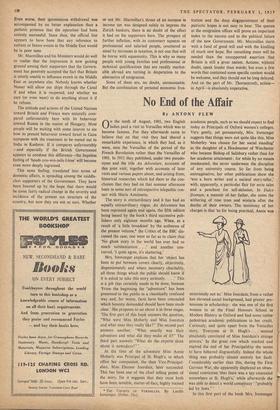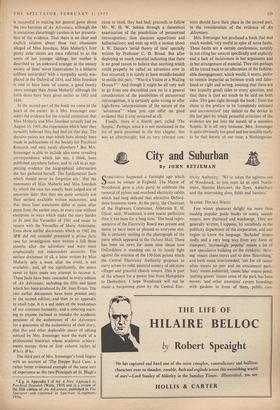No End of the Affair
By ANTONY FLEW
ON the tenth of August, 1901, two English ladies paid a visit to Versailles which was to become famous. For they afterwards came to believe that on that visit they had shared a remarkable experience, in which they had, as it were, seen the Versailles of the period of the French Revolution rather than the Versailles of 1901. In 1911 they published, under two pseudo- nyms and the title An Adventure, accounts of this joint visit; together with accounts of later visits and various papers about, and arising from, historical researches which led them to the con- clusion that they had on that summer afternoon been in some sort of retrospective telepathic con- tact with Marie Antoinette.
The story is extraordinary and it has had an equally extraordinary vogue. An Adventure has been reprinted again and again, the fifth edition being issued by the book's third successive pub- lishers only eighteen months ago. When, as a result of 'a little broadcast' by the authoress of the present volume,* the Critics of the BBC dis- cussed the case, one went so far as to claim that 'No ghost story in the world has ever had so much substantiation . . .' and another con- curred, '1 quite agree, it's shattering.'
Mrs. lremonger explains that her 'object has been to put between covers clearly, objectively, dispassionately and where necessary charitably, all those things which the public should know if
it is asked to take this story seriously. . .' This is a job that certainly needs to be done, because 'From the beginning the "adventure" has been presented to the public in a chaotically confused way and, far worse, facts have been concealed which honesty demanded should have been made clear.' She proposes to set about it in three stages. 'The first part of this book answers the question, "Who were Miss Moberly and Miss Jourdain and what were they really like?" The second part answers another, "What exactly was their adventure and what did they make of it?" The third part answers "What do the experts think about it nowadays?" ' At the time of the adventure Miss Annie Moberly was Principal of St. Hugh's, to which office her companion, the then Vice-Principal- elect, Miss Eleanor Jourdain, later succeeded. This has been one of the chief selling points of the story, for it suggests that they must both have been sensible, matter-of-fact, highly trained * THE GHOSTS OF VERSAILLES. By Lucille Iremonger. (Faber. 21s.) academic people, such as we should expect to find today as Principals of Oxford women's colleges. Very gently, yet persuasively, Mrs. lremonger suggests that things were not quite like this. Miss Moberley 'was chosen for her social standing' as the daughter of a Headmaster of Winchester who became Bishop of Salisbury rather than for her academic attainment : for while by no means uneducated, she never underwent the discipline of any university course. So far from being unimaginative, her other publications show she 'was a born writer and a natural story-teller,' with, apparently, a particular flair for eerie tales and a penchant for self-delusion. In Dulce Damn?, a memoir of her father, she notes the withering of rose trees and wistaria after the deaths of their owners. The testimony of her charges is that 'as for being practical, Annie was notoriously not so.' Miss Jourdain, from a rather less elevated social background, had greater pre- tensions to scholarship: she was one of the first women to sit the Final Honours School in Modern History in Oxford and had some rather pedestrian academic publications to her credit. Curiously, and quite apart from the Versailles story, 'Everyone at St. Hugh's . . . seemed absolutely convinced of Miss Jourdain's strange powers.' In the great row which marked and marred the end of her Principalship she seems to have behaved disgracefully. Indeed the whole thing was probably almost entirely her fault. Considerably earlier than this, during the First German War, she apparently displayed an obses- sional conviction 'that there was a spy concealed somewhere at St. Hugh's,' while afterwards she was able to detect a world conspiracy "probably led by Jews." ' In this first part of the book Mrs. Iremonger is successful in making her general point about the two heroines of An Adventure, although she is sometimes disturbingly careless in her presenta- tion of the evidence. Thus there is no clear and explicit citation about these two obsessions alleged of Miss Jourdain, Miss Moberly's four pretty elder sisters are once referred to as the aunts of her younger siblings, her mother is described as 'an awkward stranger in the uneasy society of dons' wives (innovations in a hitherto celibate university)' with a sympathy surely mis- placed in the Oxford of 1834, and Miss Jourdain is said to have been 'of course, a good twenty years younger than Annie Moberly' although the birth dates have been given earlier as 1863 and 1846.
In the second part of the book we come to the heart of the matter. In it Mrs. Iremonger con- siders the evidence for the crucial contention that Miss Moberly and Miss Jourdain actually had on August 10, 1901, the experiences which later they certainly believed they had had on that day. The decisive points are ones which have already been made in publications of the Society for Psychical Research and very rarely elsewhere.* But Mrs. Iremonger is able to include also some revealing correspondence which has not, I think, been published anywhere before, and to call in as sup- porting evidence the biographical information she has gathered herself. The fundamental facts which should never be forgotten are: that the statements of Miss Moberly and Miss Jourdain by which the case has usually been judged are of uncertain date; that they are quite certainly not their earliest available written statements; and that these later statements differ at point after point from the earlier ones, in every case without exception in ways which make the story harder to fit into the Versailles of 1901 and easier to square with the Versailles of Marie Antoinette. Even these earlier documents which in 1902 the SPR did not consider presented a prima facie case for investigation were written a full three months after the adventure and were most emphatically not independent accounts. The earliest dodument of all, a letter written by Miss Moberly only a week after the event, is not available : and, all too significantly, she seems never to have made any attempt to recover it. These facts have been concealed in every edition of An Adventure, including the fifth and latest which has been produced by Dr. Joan Evans. The two earlier documents have been printed only in the second edition, and then in an appendix in small type. It is a sad index of the weaknesses of our common humanity, and a sobering warn- ing to anyone inclined to mistake the academic positions of the authoresses of An Adventure for a guarantee of the authenticity of their story, that this and other deplorable pieces of editing noticed by Mrs. Iremonger were the work of a professional historian whose academic achieve- ments occupy three or four column inches of Who's Who.
The third part of Mrs. Iremonger's book begins with an account of 'The Dieppe Raid Case,' a rather better evidenced example of the same sort of experience as the two Principals of St. Hugh's • E.g. in Appendix I of my A New Approach to Psychical Research (Watts, 1953) and in a review of the fifth edition.of An Adventure, published in The Spectator and reprinted in Spectrum (1.ongmtins, 1956). came to think they had had; proceeds to follow Mr. W. H. W. Sabine through a theoretical examination of the possibilities of paranormal retrocognition; then discusses apparitions and hallucinations; and ends up with a section about J. W. Dunne's 'serial theory of time' specially written by Professor C. D. Broad. But after deploying so much material indicating that there is no good reason to believe that anything which could properly be called an adventure ever in fact occurred, it is surely at least muddle-headed to entitle this part, ' "Was it a Vision or a Waking Dream?"' And though it might be all very well to go from one discredited case on to a general consideration of the possibilities of paranormal retrocognition, it is certainly quite wrong to offer high-flown 'interpretations of the. nature of the "adventure"' when you can offer no good evidence that it ever occurred at all.
Finally, there is a fourth part, called 'The Sceptic.' Perhaps, since it is not mentioned in the list of parts promised in the first chapter, this was an afterthought; but its very relevant con- tents should have their place in the second part, in the consideration of the evidence of An Adventure.
Mrs. Iremonger has produced a book that wag much needed, very useful in spite of some faults. These faults are a certain carelessness, notably in not citing her sources specifically and explicitly and a lack of incisiveness in her arguments and in her arrangement of material. They can perhaps all be traced back to an affectation of the fashion- able disengagement, which would, it seems, prefer to remain impartial as between truth and false- hood or right and wrong, insisting that there are two (equally good) sides to every question, and that there is (just as) much to be said on both sides. This goes right through the book : from the claim in the preface to be 'completely unbiased and uncommitted' (my italics) to the device in the last part by which powerful criticisms of the evidence are put into the mouth of a nameless Sceptic. It is all very tiresome. Mrs. Iremonger is quite obviously too good and too sensible really to be that heretic of our time, a Nothingarian.



































 Previous page
Previous page